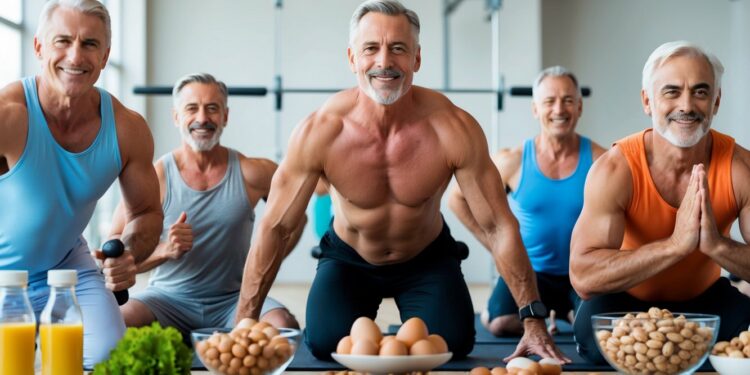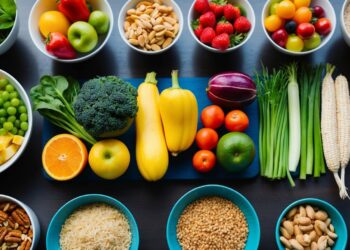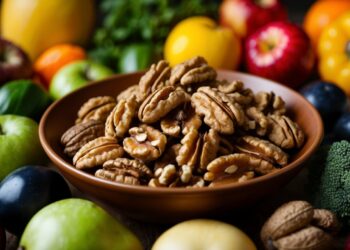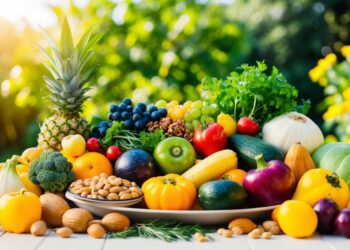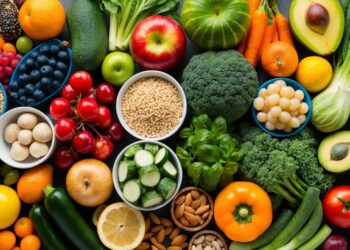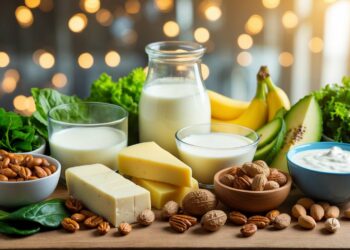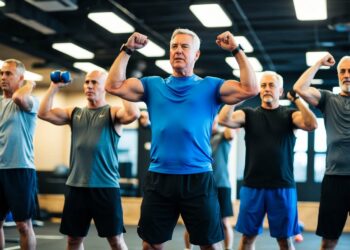As men hit 50, their bodies start to change. Muscles can shrink and weaken, making everyday activities harder. Protein becomes even more important during this time of life to help maintain strength and independence.
Research shows that older adults need more protein than younger people – about 1.2 grams per kilogram of body weight compared to the standard 0.36 grams per pound for younger adults. For example, if you weigh 180 pounds (about 82 kilograms), you might need around 98 grams of protein daily to keep your muscles strong.
Getting enough protein helps you stay active and independent as you age. It supports your muscles, bones, and overall health. While protein powders can be helpful, focusing on whole food sources like lean meats, fish, eggs, and plant proteins gives you the best nutrition. Just be careful not to go overboard – experts suggest keeping protein to 10-35% of your daily calories.
Understanding Protein and Aging
As you age, your body’s relationship with protein changes significantly. Protein becomes even more crucial for maintaining muscle mass, supporting recovery, and promoting overall health in your later years.
The Role of Protein in Muscle Maintenance
Your muscles naturally lose strength and size as you get older. This isn’t just about looking fit—it’s about staying independent and healthy. Protein provides the building blocks (amino acids) your body needs to repair and maintain muscle tissue.
Without enough protein, your muscles break down faster than they rebuild. This affects your ability to do everyday activities like carrying groceries, climbing stairs, or even getting out of a chair.
Protein also helps with:
- Wound healing and recovery
- Immune system function
- Hormone production
- Maintaining healthy skin, hair, and nails
Your metabolism slows with age, making it harder to process nutrients efficiently. This means you actually need more protein as you get older, not less.
Addressing Sarcopenia
Sarcopenia is the age-related loss of muscle mass, strength, and function. It affects about 10% of adults over 50 and up to 50% of those over 80. This condition isn’t just about looking less muscular—it significantly increases your risk of falls, fractures, and loss of independence.
The good news? Proper protein intake combined with resistance exercise can slow or even reverse sarcopenia.
Key strategies to fight sarcopenia include:
- Regular strength training (even light weights help)
- Consistent protein intake throughout the day
- Vitamin D supplementation when needed
- Staying active with daily movement
Timing matters too. Having protein shortly after exercise helps maximize muscle repair and growth, even in your 50s, 60s, and beyond.
Protein Intake Recommendations
The standard Recommended Dietary Allowance (RDA) for protein is 0.8g per kilogram of body weight. However, research shows this is likely too low for older adults.
Most experts now recommend:
- 1.2-2.0g per kilogram of body weight daily for adults over 50
- Higher end of range (closer to 2.0g/kg) if you’re active or trying to build muscle
For a 180-pound (82kg) man, that means about 98-164g of protein daily.
Try to spread your protein intake throughout the day rather than having it all at one meal. Your body uses protein more efficiently in 25-30g portions.
Good protein sources include lean meats, fish, eggs, dairy, legumes, and quality protein supplements when needed. Choose less processed options that also provide other nutrients your body needs.
Optimal Sources of Protein for Men Over 50
Finding the right protein sources can make all the difference in maintaining muscle mass and overall health as you age. The best options combine quality, digestibility, and nutrients that support your changing body.
Animal-Based Protein Choices
Lean meats are excellent protein sources for men over 50. Chicken breast, turkey, and lean cuts of beef provide complete proteins with all essential amino acids your body needs. A 3-ounce serving of chicken breast offers about 26 grams of high-quality protein.
Fish deserves special attention in your diet. Salmon, tuna, and mackerel deliver protein along with heart-healthy omega-3 fatty acids. Try to include fish in your meals twice weekly.
Dairy products like Greek yogurt and cottage cheese are protein powerhouses. Greek yogurt contains roughly twice the protein of regular yogurt (15-20 grams per cup) and provides calcium for bone health. Low-fat dairy options help you get protein without excess saturated fat.
Eggs remain one of the most versatile and complete protein sources. One large egg contains about 6 grams of protein with all nine essential amino acids.
Plant-Based Protein Options
Legumes like beans, lentils, and chickpeas offer substantial protein plus fiber. A cup of cooked lentils provides around 18 grams of protein and helps regulate blood sugar levels.
Nuts and seeds pack protein in convenient packages. Almonds (6g protein per ounce), walnuts, and chia seeds make excellent snacks. Try almond butter on whole grain toast for a protein boost.
Tofu and edamame are complete plant proteins with all essential amino acids. A half-cup of tofu contains about 10 grams of protein and is incredibly versatile in cooking.
Whole grains contribute modest but meaningful protein. Quinoa stands out with 8 grams per cooked cup and contains all essential amino acids, unlike most grains.
Protein-Rich Recipes for Every Meal
Breakfast Protein Boosters:
- Greek yogurt parfait with berries, nuts, and a sprinkle of chia seeds (20g protein)
- Veggie omelet with 2 eggs and 1/4 cup cottage cheese (18g protein)
- Overnight oats made with milk, protein powder, and nut butter (25g protein)
Lunch Options:
- Tuna salad sandwich on whole grain bread with a side of edamame
- Chicken and bean soup with a sprinkle of nutritional yeast
- Lentil bowl with roasted vegetables and tahini dressing
Dinner Ideas:
- Baked salmon with quinoa and roasted Brussels sprouts
- Turkey chili loaded with beans and topped with Greek yogurt
- Tofu stir-fry with brown rice and plenty of colorful vegetables
Try preparing meals in advance for the week. This helps ensure you consistently get the protein your body needs without daily cooking stress.
Integrating Protein with Physical Activity
Protein and exercise work together to help you maintain muscle as you age. When you combine the right amount of protein with regular physical activity, you’ll see better results than with either one alone.
The Synergy Between Protein and Exercise
Your body needs both protein and movement to fight muscle loss after 50. Research shows that adults who don’t do regular strength training may lose 4-6 pounds of muscle per decade. This condition, called sarcopenia, can be slowed down with the right approach.
When you exercise, you create tiny tears in your muscles. Protein provides the building blocks your body needs to repair and grow those muscles. Without enough protein, your workouts won’t give you the results you want.
For the best results, aim for 1.1-1.5 grams of protein per kilogram of body weight if you exercise regularly. That’s higher than what inactive people need.
Strength Training for Enhanced Muscle Growth
Weight training is your best friend for building muscle after 50. Try to do strength exercises at least twice a week, focusing on all major muscle groups.
Start with:
- Body weight exercises (push-ups, squats)
- Resistance bands
- Light dumbbells
Then gradually increase the challenge as you get stronger. Even just 20-30 minutes per session can make a big difference.
The key is consistency rather than intensity. Regular, moderate strength training is better than occasional intense workouts that might lead to injury.
Your muscles become more resistant to growth as you age, which means you need both proper exercise and adequate protein to see results.
Post-Workout Protein: Timing and Choices
The two-hour window after exercise is prime time for protein consumption. Try to get 30-35 grams of protein within this period to maximize muscle building.
Good post-workout protein options:
- Greek yogurt with berries
- Protein smoothie with fruit and milk
- Tuna or chicken sandwich
- Hard-boiled eggs
- Cottage cheese with fruit
A protein shake can be convenient, but whole foods often provide additional nutrients. If you choose supplements, look for ones specifically formulated for older adults.
Morning workouts paired with a protein-rich breakfast can be especially effective. Try making a smoothie with Greek yogurt, banana, berries, and a tablespoon of peanut butter for about 25 grams of protein.
Holistic Health Benefits of Adequate Protein
Getting enough protein does more than just maintain your muscles. Proper protein intake positively affects your entire body, from keeping your weight in check to strengthening your bones and boosting your immune system.
Managing Weight and Metabolic Health
Protein helps you manage your weight as you age. When you eat protein-rich foods, you feel fuller longer, which helps control hunger and reduces overall calorie intake. This can be especially helpful if you’re trying to maintain a healthy weight after 50.
Adequate protein also supports your metabolic health. It helps regulate blood sugar levels, which is important for preventing type 2 diabetes. The energy your body uses to digest protein (known as the thermic effect) is higher than for carbs or fats, meaning you burn more calories processing protein.
Many men find that following approaches like “The Whole Body Reset” that emphasize protein at every meal helps maintain a healthy weight without feeling deprived.
Improving Bone Health and Preventing Injuries
Your bones need protein too! Contrary to outdated beliefs, proper protein intake actually strengthens your bones rather than weakening them. This becomes increasingly important after 50 when bone density naturally decreases.
Strong bones mean fewer falls and fractures. When combined with calcium and vitamin D, protein helps maintain bone strength and structure. This trio works together to keep your skeletal system healthy.
Regular protein intake also supports the connective tissues around your joints. This can reduce injury risk during daily activities and exercise, helping you stay active and independent longer.
Supporting Immune Function and Overall Well-Being
Protein is essential for a strong immune system. Many immune cells and antibodies that fight infection are made from protein. Getting enough protein helps your body defend against illnesses more effectively.
The amino acids in protein serve as building blocks for virtually all body tissues. They help repair cells, create hormones, and support organ function. This comprehensive support improves your overall quality of life.
A balanced diet with adequate protein gives you more energy for daily activities. When protein is properly distributed throughout your day, you’ll likely notice improved mood, better concentration, and greater stamina for both physical and mental tasks.
